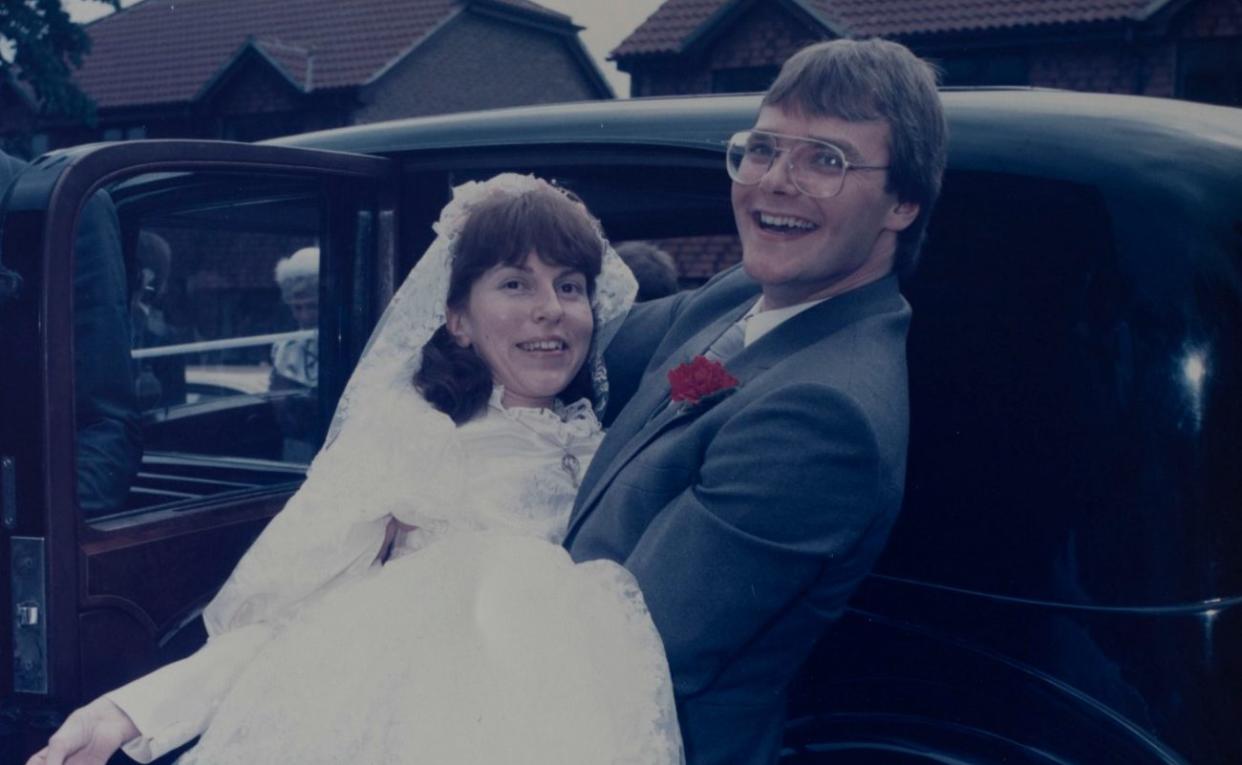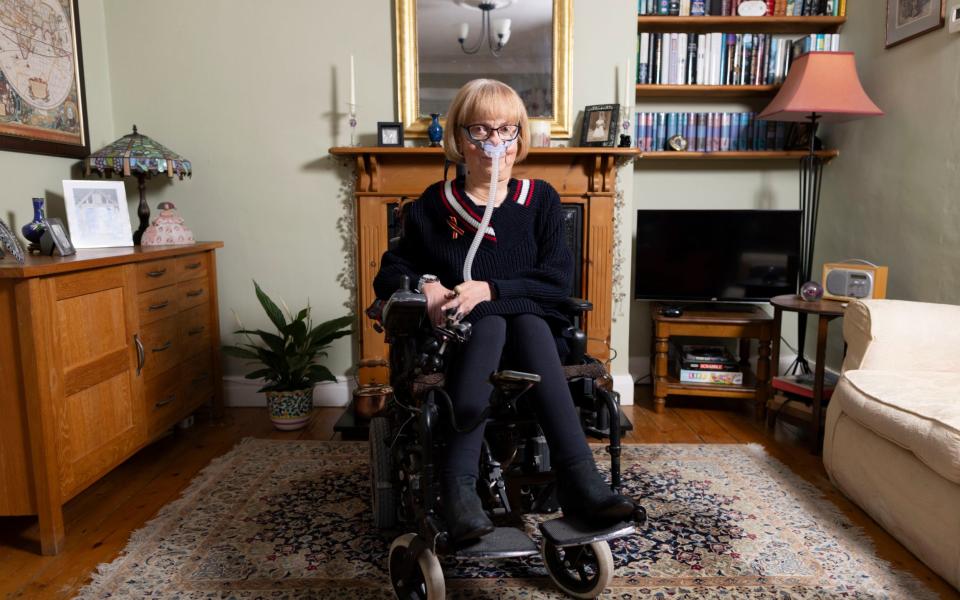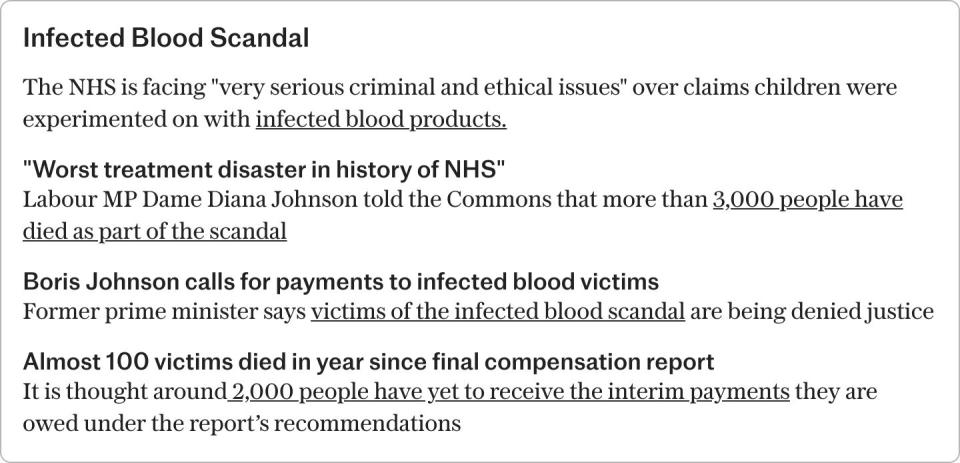‘Factor VIII was a wonder drug - but little did we know it was also lethal’

For an engaged couple, there is the promise of a honeymoon and a lifetime of happiness to follow the big day.
But for Jane and her husband Graham Armstrong Ingleson, there was a cloud hanging over them when they said their vows.
As a bespectacled Graham, a burly and kind man in his 20s, lifted Jane out of their car in her bridal gown, the couple were still reeling from a medical appointment two months prior.
Graham, a haemophiliac who had been diagnosed with HIV two years before, had been told by a doctor at London’s St Thomas’ Hospital that he would develop AIDS and that he would likely die within five years.
But Graham, a heating engineer from Bedale in the Yorkshire Dales, had not caught the deadly virus by taking drugs or through any action of his own. He caught it after taking a medicine prescribed to him by the NHS, a “miracle drug” called Factor VIII.
The white powder contained proteins from tens of thousands of donors and provided Graham with a blood-clotting molecule that his genetic condition prevented him from making himself.
Without it, he would suffer agonising internal bleeds and any minor injury could be life-threatening. For centuries beforehand, sufferers would live sheltered lives and be prone to injury and sickness. Few lived beyond the age of 40.
But with it, Graham was transformed into a fully able-bodied man, determined to live his life to the fullest.
“He was disabled, but nobody knew it because of his medication,” Baroness Campbell of Surbiton, as Jane is now formally known, told The Telegraph in an exclusive interview.
“Factor VIII was instrumental, it was a wonder drug and a haemophiliac’s passport to a normal life. But little did we know it was also lethal.”
Graham, like 1,250 others, contracted HIV from Factor VIII imported from the US where blood donors were paid to give plasma. Many donors were sex workers, gay men, prisoners and the homeless. Screening for diseases was poor, the product was not cleaned and one vial of Factor VIII contained proteins from tens of thousands of high-risk donors.
Romance blossomed at reunion party
Baroness Campbell, in her first newspaper interview about her personal involvement in the infected blood scandal, told The Telegraph that she believes her husband contracted hepatitis C and HIV after crashing his new car in the countryside and being treated by notorious haematologist Dr Peter Jones of Newcastle Infirmary.
Graham was normally treated by Dr Geoffrey Savidge at St Thomas, who was known to favour using imported Factor VIII from the US.
Speaking in her south-west London bungalow, Baroness Campbell said: “Graham was very full of life, he loved life. He loved going to the pub. He never said a bad word about anyone. Everyone loved him.”
The pair had met at Herewood college for disabled people in Coventry and struck up a budding romance. Graham went there for his haemophilia, while Jane’s progressive spinal muscular atrophy meant she was wheelchair bound all her life.

After going their separate ways – Jane to Hertfordshire University where she would find a passion for feminism and equal rights campaigning; Graham to college in Scarborough to become an engineer – they reunited as adults at a party in Croydon.
“We had both grown up. He was a man now and he was even more gorgeous. Everyone liked him, and we were a very good complement. He was very practical, and I was the one who wanted to change the world,” Baroness Campbell said.
At college, Graham and his clique of friends, all haemophiliacs, would take Factor VIII before heading out for a night at the pub to protect against the inevitable bumps, scrapes and bruises that go hand-in-hand with the rambunctious escapades of inebriated young men.
The couple were told in 1985 that Graham had HIV, at the height of the worry about the emerging public health concern, but they were not told about the implications of such a diagnosis.
“We were told it’s not the same HIV that is infecting the gay community. We just went home. We were going to get married and were just like any other mid-20s couple,” Baroness Campbell said.
My father died in a car crash
It was not until summer 1987 that the couple learnt of Graham’s true fate, on the eve of their wedding. An unfamiliar doctor broke the news, and Baroness Campbell said it felt “like you slipped off the edge of the world”.
She said: “He was put on a new trial of AZT, and that was the beginning,” she recalled, speaking in her study.
“This was less than two months before our wedding and my father died in a car crash around that time. I think that was one of the worst times of my life.”
Baroness Campbell, a crossbench peer, has been in the Lords for 15 years after a lifetime of campaigning for the rights of disabled people and equality.
“I’ve always been political and I’d always wanted to be an MP, but knew I would never be able to withstand the practicalities, the doorstepping and all the meetings.”
Baroness Campbell’s career was flourishing after a string of promotions at the Greater London Council (GLC) under Ken Livingstone. But with Graham’s worsening condition, money was tight and the couple had to turn to the McFarlane Trust for “blood money” ex gratia payments to get by.
“We got handouts, literally, to keep us surviving through it, but we never lived again. There is a difference between living and surviving.
“We were so poor that we had to go cap in hand to get some money to pay someone to take Graham up north to see his parents for the last time.”
Graham deteriorated, and was unable to work from about 1991. He saw his younger brother, Anthony, also die from AIDS after catching HIV from Factor VIII.
“For his final two years he couldn’t work because he was so ill, in monstrous ways, unimaginable ways.
Book of remembrance
“He was disabled once, became able-bodied, and then became disabled all over again but worse. I think it compounded the horror. If you’re given something and it’s taken away from you, it’s a worse thing. Who wants to give away their toys? Nobody. It was like being at war in your own house. “
Graham died on December 19, 1993. Baroness Campbell returns every year, on the anniversary, to St Botolph’s church where there is a book of remembrance for haemophiliacs who were killed by the scandal. The book continues to get new entrants.
The baroness has been reluctant to get involved with the campaign, not wishing to be viewed as a victim of the scandal. She is defined and heralded for her indefatigable work for equality for all disabled people, but she was also widowed by a drug the NHS gave her husband.
She wants Jeremy Hunt, the Chancellor, a long-time advocate of speedy compensation and justice for what is known as the biggest treatment disaster in NHS history, to emerge from his “black hole” in the Treasury and make good on pledges to finally deliver justice.
Swift compensation and a full, earnest apology are her two wishes. Revenge is not on the agenda of the baroness. Recognition, however, is.
She speculates towards the end of our conversation that what happened to haemophiliacs, specifically the boys at the Treloar’s School and College for disabled children where dozens of boys were experimented on with Factor VIII against their will, would not have happened to able-bodied people.
“We are seen as people who are in need of care, who are tragic, who are victims, who are struggling, who are suffering from our disabilities. We are not seen as people who are important human beings.”
Anger is still there at your core
This disdain was compounded by decades of denial, delay and cover-up. Still, the Government has yet to pay compensation to victims.
The baroness wants the Government to not only apologise for its part in the deaths of thousands of innocent people, but to acknowledge the harm this did to families, spouses and children.
“We didn’t have Elton John. We didn’t have anybody as our cheerleader. And more than that, people tried to cover it up, that it was someone else’s fault,” she said.
“Women were also giving up a lot. Many people forget what it did to marriages. We just got married, but we didn’t have a marriage because we were too scared to enjoy the honeymoon years. A lot of us became nuns, not that we wanted to, but we thought it was the only way to keep safe.
“Women gave up their childbearing years and those that didn’t, were in danger of giving birth to infected children. Women were also giving up their careers, for example. I was shooting up in my career and then came to a stop. I lost five or six years of that time of your life where you are at the peak of your career. You had to give up a lot.
‘The apology has never really come’
She is speaking now, ahead of the Infected Blood Inquiry’s final report on May 20, to try to push the Government to finally, after four decades, deliver justice.
“I want everybody to be treated with financial respect and also given an apology. It has never really come.
“For me it is all about the apology and the financial settlement which will show they were wrong. For me, the most important thing is to give the bloody money to the living first and foremost. Don’t worry about me or anyone else, give them the money, give mine as well if it helps.”
After 15 years in the Lords, Baroness Campbell took a year out and is now back, hungry to bring about change once more. She never expected to be wading into the infected blood inquiry, which she says “is really difficult for me to do”, but is giving her voice to the campaign now.
“This is not what I wanted to do after a year out, “ she said as we flicked through her wedding photo album.
“But I think of Graham, and he would say: ‘Do this for the boys.’ I am doing it for the boys, but I am also doing it for the girls’.’
Listen to Bed of Lies, a six-part Telegraph podcast laying bare one of the biggest medical disasters in history, the Infected Blood scandal, on Apple Podcasts, Spotify or your preferred podcast app.


 Yahoo News
Yahoo News 
